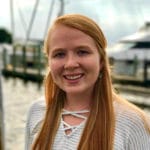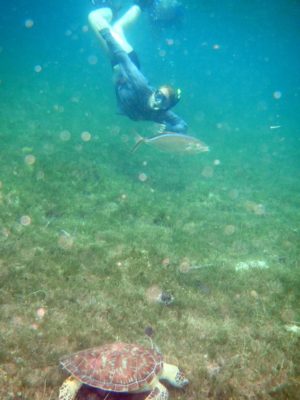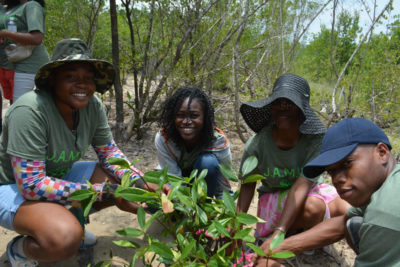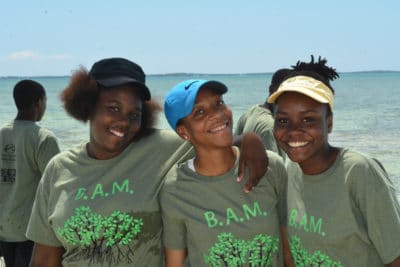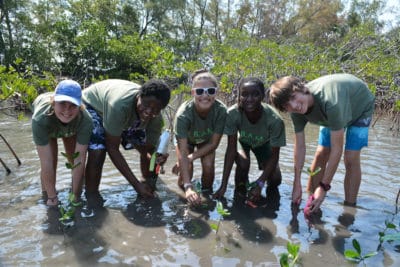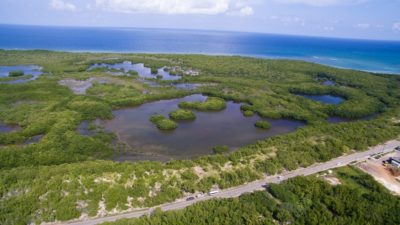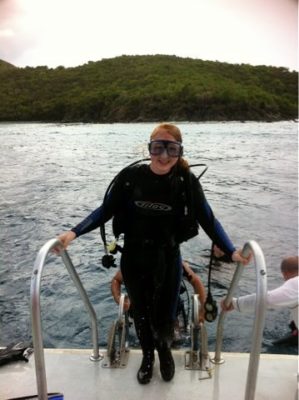Maggie Dillon is a Science and Education Intern for the Khaled bin Sultan Living Oceans Foundation (KSLOF). She is a senior at St. John’s College in Annapolis Maryland. After graduating, Maggie is interested in pursuing a Master’s Degree in Marine Biology.
My Education Internship
I have always loved the ocean. The first time I ventured into the world beneath the water, I was seven years old. My family took a trip to the Bahamas, and while I was not old enough to scuba dive with the rest of my family, I was ready to spend as much time snorkeling as possible. As I stood on the shore of the crystal blue waters with my mask, flippers and snorkel in hand, I could hardly contain my excitement. I was so excited in fact, I willingly ignored the fact that my mask was cracked and would flood every time I put my face into the water. I came home red eyed, sunburned, and determined to name all the fish I had seen. I loved everything about being in the ocean – cracked mask and all.
Maggie scuba snorkeling in the Bahamas
You can only imagine my excitement when I started interning for the Foundation in the Fall of 2016. Being able to now intern at an organization that fights to protect the marine ecosystems I care so deeply about has been a goal of mine since I was snorkeling for that first time. During my time here with the Foundation, I spend half my time working with the Science Department and the other half with the Education Department, interning for the Director of Education, Amy Heemsoth. My day to day duties with the Education Department are never the same, but the work is always interesting.
One of my favorite duties is assisting with the B.A.M. (Bahamas Awareness of Mangroves) and J.A.M.I.N. (Jamaica Awareness of Mangroves In Nature) programs. Through these programs, the Foundation and their local partners provide outdoor education to high school students in Jamaica and the Bahamas. They teach students about their mangrove ecosystem and the importance of conserving it. Evaluations are used to gauge the progress, retention, and change in attitudes and actions of the students as they progress through the program and learn about this valuable ecosystem. I’ve been tasked with organizing the evaluation data and looking for errors during data entry. Although this may not sound like the most thrilling of tasks, it’s truly rewarding.
Students conducting mangrove restoration as part of the J.A.M.I.N. and B.A.M. programs
As I’m sifting through three years of data, I see that the initial response of most students is that they have never been to the mangroves and even fewer students knew about their ecological importance. After the programs implementation, the evaluation data shows the students are more aware about the mangrove ecosystem and the importance of their protection and conservation.
Aerial view of mangrove restoration site in Falmouth, Jamaica
I love seeing the students’ transformation, even it if it’s only on paper. I still remember my first time snorkeling in the Bahamas and how that one experience sparked a lifelong interest in the marine sciences. That one outdoor experience made me want to learn more about the ocean and how to protect it. It’s extremely rewarding to see the same transformation in these high school students in Jamaica and the Bahamas and how the B.A.M and J.A.M.I.N. programs have sparked their interests. It gives me hope that through educational programs like these, new generations of youth are becoming more motivated to protect and conserve our world’s ocean.
After finding a love for the ocean, Maggie learned to scuba dive
By interning in both the science and education departments I have been able to see how interconnected the two fields truly are. I get to see and help with the collection and processing of information within the science department and then I see that information implemented into people’s everyday lives through education. While I am not sure which facet of marine biology I will pursue after graduation, I do know for certain that I want to continue working and helping to conserve our world’s ocean.
